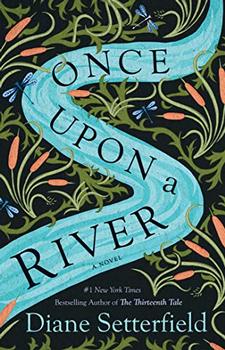Summary | Excerpt | Reading Guide | Reviews | Beyond the Book | Readalikes | Genres & Themes | Author Bio

"It is a little girl."
In all the discussion around the injured man, nobody heard.
Again, louder: "It is a little girl!"
They turned.
"She won't wake up." He held out the sodden little body so that they might see for themselves.
They turned. They moved to stand around Jonathan. A dozen pairs of stricken eyes rested on the little body.
Her skin shimmered like water. The folds of her cotton frock were plastered to the smooth lines of the limbs, and her head tilted on her neck at an angle no puppeteer could achieve. She was a little girl, and they had not seen it, not one of them, though it was obvious. What maker would go to such lengths, making a doll of such perfection only to dress it in the cotton smock any pauper's daughter might wear? Who would paint a face in that macabre and lifeless manner? What maker other than the good Lord had it in him to make the curve of that cheekbone, the planes of that shin, that delicate foot with five toes individually shaped and sized and detailed? Of course it was a little girl! How could they ever have thought otherwise?
In the room usually so thick with words, there was silence. The men who were fathers thought of their own children and resolved to show them nothing but love till the end of their days. Those who were old and had never known a child of their own suffered a great pang of absence, and those who were childless and still young were pierced with the longing to hold their own offspring in their arms.
At last the silence was broken.
"Good Lord!"
"Dead, poor mite."
"Drowned!"
"Put the feather on her lips, Ma!"
"Oh, Jonathan. It is too late for her."
"But it worked with the man!"
"No, son, he was breathing already. The feather only showed us the life that was still in him."
"It might still be in her!"
"It is plain she is gone, poor lass. She is not breathing, and besides, you have only to look at her color. Who will carry the poor child to the long room? You take her, Higgs."
"But it's cold there," Jonathan protested.
His mother patted his shoulder. "She won't mind that. She is not really here anymore and it is never cold in the place she has gone to."
"Let me carry her."
"You carry the lantern, and unlock the door for Mr. Higgs. She's heavy for you, my love."
The gravel digger took the body from Jonathan's failing grip and lifted her as though she weighed no more than a goose. Jonathan lit the way out and round the side to a small stone outbuilding. A thick wooden door gave onto a narrow windowless storeroom. The floor was of plain earth, and the walls had never been plastered or paneled or painted. In summer it was a good place to leave a plucked duck or a trout that you are not yet hungry for; on a winter night like this one it was bitter. Projecting from one wall was a stone slab, and it was here that Higgs laid her down. Jonathan, remembering the fragility of the papier-mâché, cradled her skull - "So as not to hurt her" - as it came into contact with the stone.
Higgs's lantern cast a circle of light onto the girl's face.
"Ma said she's dead," Jonathan said.
"That's right, lad."
"Ma says she's in another place."
"She is."
"She looks as though she's here, to me."
"Her thoughts have emptied out of her. Her soul has passed."
"Couldn't she be asleep?"
"Nay, lad. She'd've woke up by now."
The lantern cast flickering shadows onto the unmoving face, the warmth of its light tried to mask the dead white of the skin, but it was no substitute for the inner illumination of life.
"There was a girl who slept for a hundred years, once. She was woke up with a kiss."
Higgs blinked fiercely. "I think that was just a story."
The circle of light shifted from the girl's face and illuminated Higgs's feet as they made their way out again, but at the door he discovered that Jonathan was not beside him. Turning, he raised the lantern again in time to see him stoop and place a kiss on the child's forehead in the darkness.
Excerpted from Once Upon a River by Diane Setterfield. Copyright © 2018 by Diane Setterfield. Excerpted by permission of Atria Books. All rights reserved. No part of this excerpt may be reproduced or reprinted without permission in writing from the publisher.
If you want to build a ship, don't drum up people... but rather teach them to long for the endless immensity of the...
Click Here to find out who said this, as well as discovering other famous literary quotes!
Your guide toexceptional books
BookBrowse seeks out and recommends the best in contemporary fiction and nonfiction—books that not only engage and entertain but also deepen our understanding of ourselves and the world around us.